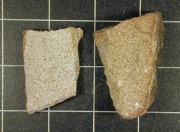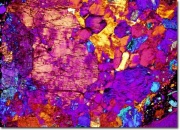Difference between revisions of "Arkose"
Jump to navigation
Jump to search
m (Text replace - "== Authority ==" to "== Sources Checked for Data in Record ==") |
|||
| Line 14: | Line 14: | ||
Arkose effervesces slightly with a drop of dilute hydrochloric acid | Arkose effervesces slightly with a drop of dilute hydrochloric acid | ||
| − | == | + | == Sources Checked for Data in Record == |
* ''Dictionary of Building Preservation'', Ward Bucher, ed., John Wiley & Sons, Inc., New York City, 1996 | * ''Dictionary of Building Preservation'', Ward Bucher, ed., John Wiley & Sons, Inc., New York City, 1996 | ||
Revision as of 12:48, 29 April 2016
Description
A coarse-grain feldspathic Sandstone. Arkose is composed of Quartz, Feldspar, Calcite, and Mica and is produced from the disintegration of Granite. It is an important type of sediment as it tends to contain a significant number of fossils. In Australia, the world's largest natural monolith, Ayers Rock, is formed by massive deposits of arkose. Arkosic sandstone is used as a dimension stone in building construction.
Synonyms and Related Terms
Arkosic sandstone; arkose (Fr.); arcosa (Esp.); arcose (Port.); Arkose (Deut.); arkose (Ned.)
Other Properties
Arkose effervesces slightly with a drop of dilute hydrochloric acid
Sources Checked for Data in Record
- Dictionary of Building Preservation, Ward Bucher, ed., John Wiley & Sons, Inc., New York City, 1996
- Anne Grimmer, Glossary of Building Stone Terms, A Glossary of Historic Masonry Deterioration Problems and Preservation Treatments, National Park Service, Washington DC, 1984
- Website address 1 Comment: Olympus Microscopy Resource Center at http://www.olympusmicro.com/galleries/polarizedlight/pages/arkosesmall.html (Accessed Sept. 17, 2005)
- Van Nostrand's Scientific Encyclopedia, Douglas M. Considine (ed.), Van Nostrand Reinhold, New York, 1976
- Random House, Webster's Encyclopedic Unabridged Dictionary of the English Language, Grammercy Book, New York, 1997

